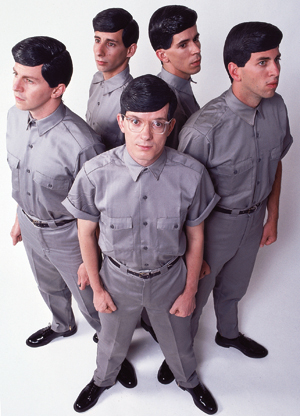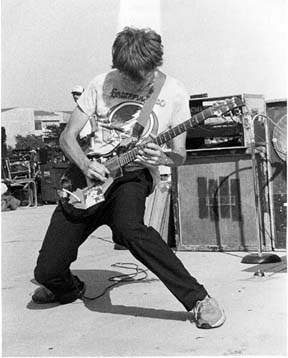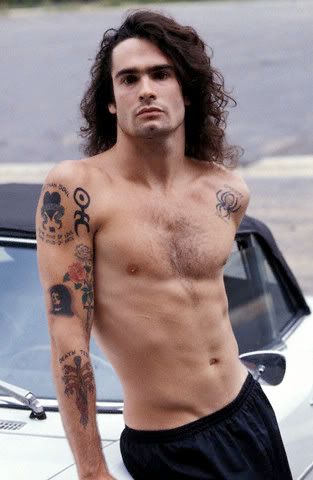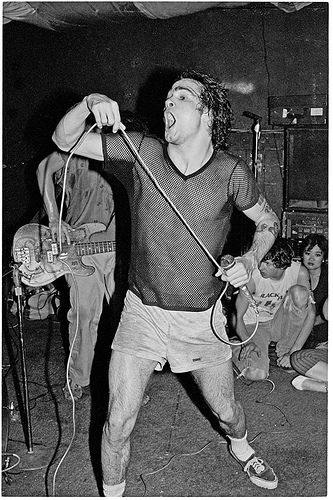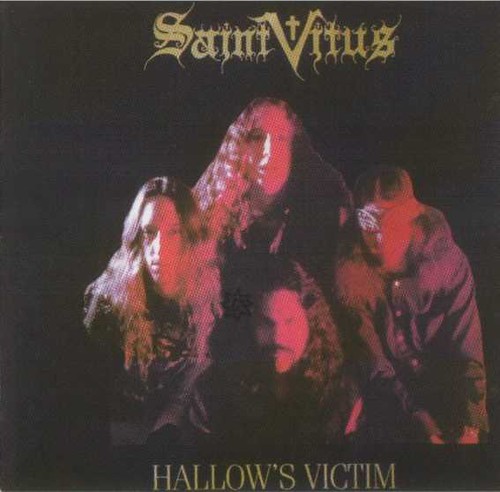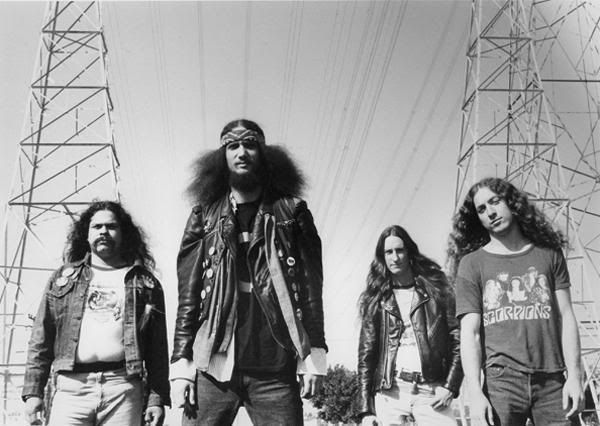ORIGINAL ALBUM:
"Born too Late" was
Saint Vitus' third album and first with Scott "Wino" Weinrich, of The Obsessed. The lyrics are more down to Earth and in your face than those on the previous Scott Reagers albums and Wino is more of an emotive, "Ozzy" type metal singer. Not a whole lot of range.
The album begins with the absolute classic title track. Co-written by original singer Scott Reagers, I've yet to hear a live bootleg of him singing it, which is a shame. If any one song had to sum up the underground doom genre, this is it - not just lyrically, but musically as well. It's simple three chord riff endlessly insisting itself onto you is one of doom's absolute highlights. Wino's vocals are probably more effective here than they ever would be again with any other band and Dave Chandler gets three opportunities to do his noise solos and all three are among his best, never leaving the listener behind wondering what the hell he's doing. In fact, throughout the album Dave's lead guitar work:
- Squelches
- Squeals
- Whines
- Wah's in all-heavy-like
- Makes moo noises
"Clear Windowpane" is widely regarded among Vitus fans as another classic. I never get the urge to listen to it, but whenever I do, I'm captivated. It's definetely a great song. The drums kinda poundy smash smash like Black Sabbath's "Children of the Grave" at half-speed. The rhythm guitar is faster and more upbeat than the title track. The track would feel a lot like a "Hallow's Victim" track if it weren't for Dave's leads making the song so damn funky.
"Dying Inside" starts off so doomy and slow I thought I was in for another "Burial at Sea", but the song has a
little more cheer and momentum than that one. There are several long stretches of extended guitar solos that are actually very cool. The song is a lyrically downbeat number about killing yourself with alcoholism.
"H.A.A.G." (I have no idea what that stands for, and the lyrics give no clear picture but I've hear it's "Hell Ain't A Game") is one of the most "up" songs on the album and it's a pretty cool song all round - one of my favourites. There's essentially the verse pieces, which feel like an analog distortion whirlwind ala
Master of Reality era Black Sabbath - and the more straight-up, hard rock-y intro which shows up every now and again. It slows down considerably in the middle. This would be a great example to illustrate the bands impressive use of dynamics. Quiet, loud, slow, fast, atmospheric or rocking, the band gives equal weight to all parts and pulls all of the parts off with flare.
"The Lost Feeling" has a slow, creepy verse which fails mostly because of the trite whispered vocals. In this context, when we actually listen to the lyrics, they fail. The chorus is a little better. It's more bluesey than most of the Vitus stuff, but definetely emotive. Dave's solo is also fairly bluesy but gets into the wahing fairly soon. There's prominant bass playing here for the verses which definetely makes a change from the other songs. A good enough song.
"The War Starter" is a clear "end" song. The verse riff is even slower and gloomier than the other material and the lyrics pertain to the endtimes - in this case war and the inevitable nuclear war. The chorus feels a little forced, but is a good chorus in and of itself. Not a classic song, but good.
The increased production values (in the SST stakes, not as muddy as "My War" but not quite as good as "Slip It In") help the band immeasurably - the drums stand out far more, Dave's guitar playing and effects sound considerably more powerful with the increased stereo range and the quiet moments (such as the verses of "The Lost Feeling") are considerably less hissy and noisey than counterparts on previous albums, such as the opening of "Burial at Sea".
Like it's clear inspiration,
Master of Reality, Vitus' own third album finds the band at their absolute peak, exploring new sounds with lots of effects and a wide variety of material. It's arguably not the best Vitus album (I myself would put both "
Mournful Cries" and "
V" before it), but it is probably
the quintessential doom metal album. It flat out admitted it's influences were so long ago as to be quite dead then laid the blueprint for how doom could admit it's contrived origins yet progress to its own (very small) scene, eventually.
CD VERSION:
The CD edition appends the band's "Thirst and Miserable" EP from later the same year. As far as I know, the songs were all recorded in the same studio as "Born Too Late" because the production seems largely identical and they fit fine with the previous album.
"Thirsty and Miserable" was never my favourite Black Flag song, but it
was their song which sounded most like Motorhead. Having said that, such comparisons are irrelevant to this slow, slow interpretation. The influence of Flag has always been apparent in the bands songs, mostly in their noisey solos, but this song doesn't
really fit Vitus' style and by presence alone seems to jar horribly with the message of "Dying Inside" (at least they didn't cover "Six Pack"!). Put simply - if you already like the band and the album, you won't skip it, but it's not going to be anyone's favourite Vitus song.
"Look Behind You" is a great Vitus song. It doesn't have a classic, anthemic chorus, but rocks in a rather different way to most Vitus songs. Dave's solos are more traditional than almost ever before but that's
okay because he's a good guitarist. It's hard to think much else to say about this - it's a great three minute hard rock song.
"The End of the End" is a great song with some truly awful lyrics. At first glance the song seems like the standard Vitus/Sabbath apocalyptic end song, much like "The War Starter"....
"Don't tell me about your problems
I don't want to hear
You brought them upon yourself
I don't want to hear
You thought nuclear war was
The right thing to do"
But eventually it becomes clear the song isn't the most serious song Vitus have ever composed:
"Now you 've brought armies of mutants
Upon me and you"
Also, during the quiet midsection, we get this awful stanza:
"Once upon a time, when everything was green
The Earth was pure and happy and everything was clean
Then along came man, he trashed and spoiled it all
And now he wonders why, why is he going to fall"
Which is yeah, awful. Musically, the verses have a truly driving riff, while the chorus has a strange, groovy riff in the Iommi/Butler mould. The middle section is a little over the top - not wildly so, it fits well enough - but when the lyrics are pushed front and centre, for whatever reason, they seem a lot more trite to me. I think it's just that anyone listen to this band is smart enough to know the lyrics are hardly the driving ambition of the band, so why draw attention to them? But the slow section eventually feature a really nice solo from Dave and soon enough we're riding back into mid-tempo-ville with some nice wah soloing.
All in all, bad lyrics aside, it's the ending song "The War Starter" wanted to be. Fortunately for us owners of the CD edition, it is the true end song.
With the "Thirsty and Miserable" EP attached, the value of "Born Too Late" is vastly increased. In this form, the CD is the best buy any Saint Vitus fan can make.
Click
HERE to go back to Saint Vitus reviews.

